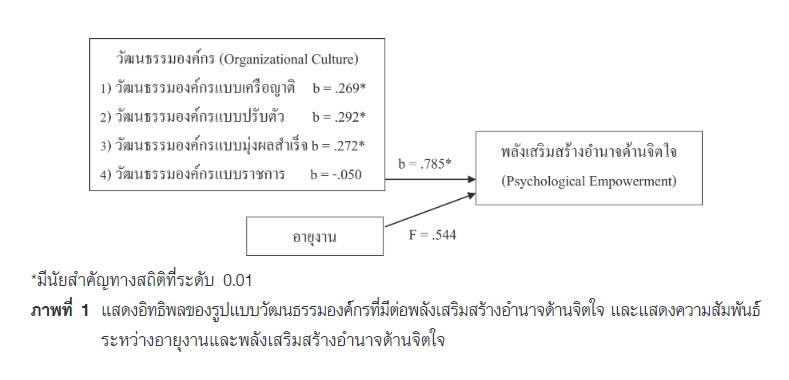THE RELATIONSHIP BETWEEN ORGANIZATIONAL CULTURE AND PSYCHOLOGICAL EMPOWERMENT AMONG THAI PROFESSIONAL FOOTBALLERS
Main Article Content
Abstract
Purpose The objective of this study was two folds: to examine the relationship between organizational culture and psychological empowerment among Thai professional footballers and to examine the level of psychological empowerment by work tenure.
Methods Survey method was employed. Respondents comprised two hundred and sixty-four Thai professional footballers in Thai league 2017. Self-report questionnaires for organizational culture and psychological empowerment were adopted from previous studies and were checked by experts. Regression analysis and ANOVA were employed to test hypotheses.
Results Organizational culture is significantly and positively associated with psychological empowerment among professional footballers in Thai league. The variance of psychological empowerment can be explained at 63.3 percent ( = 0.633 and the regression coefficient was 0.785. Hypothesis 1 was supported that organizational culture is positively associated with psychological empowerment. However, when investigating types of organizational culture, Adhocracy culture, Achievement culture and Clan culture have positive relationship with psychological empowerment among Thai professional footballers. However, results show that level of psychological empowerment is not significantly different by work tenure, in which hypothesis 2 was not supported.
Conclusion Organizational culture is significantly and positively associated with psychological empowerment among professional footballers in Thai league. The suitable types of organizational culture that are related to psychological empowerment among Thai professional footballers include Adhocracy culture, Achievement culture and Clan culture. However, level of psychological empowerment among Thai professional footballers cannot be explained by work tenure.
Article Details
References
Cameron, K. S., and Quinn, R. E. (1999). Diagnosing and Changing Organizational Culture. New York: Addison – Wesley Publishing Company.
Chaiwong, A. (2015). The Motivation effects on Thailand’s professional football players. Master’s Thesis, Chiang Mai University.
Chatpunyakul, C., and Tanchaisak, K. (2016). Psychological Empowerment and Innovative Behavior among Professional Football Team Staff in Thailand. Journal of Sports Science and Health, 17(3).
Chonwit, K. (2015). Antecedent and consequence of psychological empowerment of teacher in school under the Office of Basic Education Commission. Doctorate’s Thesis, Kasetsart University.
Garg, A. (2012). The Missing Link: The Role of Organizational Culture in Technology Change Management Communication. Master’s Thesis, University of Southern California.
Jaktheemongkol, V. (2005). Relationship between type of organizational culture and job satisfaction of employees of catering department of Thai airways international company limited at Donmuang international airport. Master’s Thesis, Valaya Alongkorn Rajabhat University under the Royal Patronage.
Kseanela, S. (2014). Organizational Culture Impact on Psychological Empowerment of Academic Staff. European Journal of Sustainable Development, 119-124.
Lorsuwannarat, T. (2003). Modern organization theory. Bangkok: Pimakson Limited Partnership.
Poolsawat, P. (2005). Organizational culture and teachers' organization service area 2. Master’s Thesis, Silpakorn University.
Sazgar, S., Hssaani, M., and Kabiri, A. (2015). Relationship between Psychological Empowerment and Job Satisfaction, Organizational Culture and Performance of Primary School Teachers in Public Schools of District I of Urmia city in academic years of 2013-2014. Arts & Humanities Journal, 7(2), 88-95.
Singnoi, C. (2004). Motivation to participate in sport of youth and club football players. Master’s Thesis, Burapha University.
Spreitzer, G. M. (1995). Psychological Empowerment in The Workplace: Dimensions, Measurement, and Validation. Academy of Management Journal, 38, 1442-1465.
Thomas, K. W., and Velthouse, B. A. (1990). Cognitive elements of empowerment. Academy of Management Review, 15(4), 666-681.
Yuwanon, P. (2009). Sport Management. Bangkok: Pimdeekarnpim Company.


